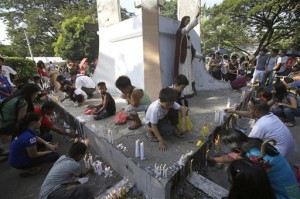Bills penalizing graveyard offenses resurrected

Filipinos light candles at Manila’s North Cemetery to honor the departed in observance of All Saints’ Day Thursday Nov.1, 2012 in Manila. The yearly observance of the feast of the dead appears to have galvanized lawmakers into reviving attempts to pass a law criminalizing the desecration of tombs or burial grounds. AP PHOTO/BULLIT MARQUEZ
MANILA, Philippines—The yearly observance of the feast of the dead appears to have galvanized lawmakers into reviving attempts to pass a law criminalizing the desecration of tombs or burial grounds.
In the Senate, the committee on justice and human rights is preparing to report out an almost forgotten bill filed by Senator Miriam Defensor-Santiago creating a separate crime for the robbery of cemetery items or those committed in cemeteries, graveyards or burial grounds.
In the House of Representatives, a pending bill filed by former President and Pampanga Representative Gloria Macapagal-Arroyo co-authored with her son Camarines Sur Rep. Diosdado Arroyo, provides that desecrating the resting place of the dead through robbery be classified as a separate crime and carry harsher penalties.
Sen. Francis Escudero, chairman of the Senate committee on justice and human rights, said a committee report was already being prepared for Santiago’s Senate Bill No. 1689, which was last heard in the committee level in July 2011.
Santiago said the damage done by grave robbery “goes beyond the measurable as it not only dishonors the deceased, it also causes anguish to those who survived them.”
Article continues after this advertisement“No matter the description of the grave, from the grandiose pyramids to Jean Valjean’s simple and unnamed gravestone, this type of theft must be severely addressed,” she said in the explanatory note to her bill.
Article continues after this advertisementSantiago’s bill seeks to amend the Revised Penal Code by inserting a provision that defines grave robbery as “the taking of all or part of a tomb, coffin, monument, gravestone, or all or part of a commemorative, decorative or other cemetery-related article or committed in a cemetery, graveyard or burial ground.”
It seeks to penalize the culprit with a penalty one degree higher than those prescribed in Articles No. 299 and 302 of the penal code on the robbery of an uninhabited place, a public building, edifice devoted to worship or private building.
Article 299 of the Revised Penal Code now speaks of a penalty of reclusion temporal or imprisonment of 12 to 20 years. Article 302, on the other hand, mandates a penalty of prision correccional or imprisonment of six months to six years.